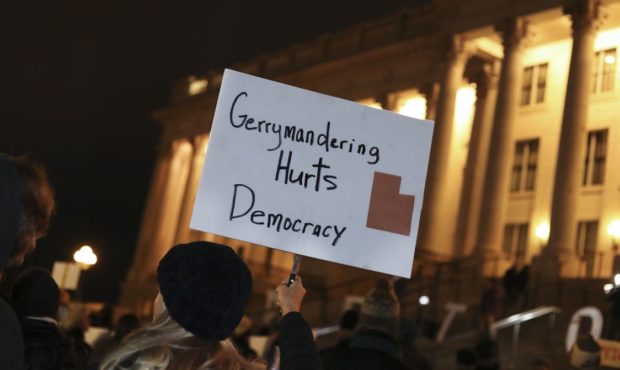Denial of stay clears way for redistricting lawsuit to move forward
Aug 23, 2022, 3:26 PM

People protesting the new congressional district map shortly after it passed through the Senate on Nov. 10, 2021. (Laura Seitz/Deseret News)
(Laura Seitz/Deseret News)
SALT LAKE CITY — A judge’s ruling denying a stay clears the way for a lawsuit challenging the redistricting process in Utah to move forward.
The 3rd District Court judge denied a request Monday from the defendants, which include legislative leaders, to stay the lawsuit.
Redistricting lawsuit background to date
The lawsuit, filed in March by the League of Women Voters, Mormon Women for Ethical Government, and others, challenges the redistricting map approved by lawmakers as violating parts of the Utah constitution. The suit named the Utah Legislature, Utah Legislative Redistricting Committee, and the following elected officials in their official capacities: Sen. Scott Sandall, R-Tremonton; House Speaker Brad Wilson, R-Kaysville; Senate President Stuart Adams, R-Layton; and Lt. Gov. Deidre Henderson, also a Republican.
The original complaint asserted the congressional electoral map approved by legislators in 2021 amounts to gerrymandering, or drawing electoral lines to benefit specific people. It pointed out voters approved Proposition 4, a ballot initiative that established an independent redistricting commission, which was later amended by lawmakers to make the commission an advisory group.
Later, the legislature approved its own redistricting map rather than the one created by the commission.
“In early November 2021, the Legislature released its gerrymandered map to Utah voters late on a Friday night in a manner that limited the opportunity for public input,” the lawsuit asserted. “In the end, both the Legislature’s redistricting committee leadership and the Governor conceded that partisan politics had affected the Legislature’s redistricting process.”
The defendants filed a joint motion requesting the stay in July, asking the judge to place the lawsuit on hold while the U.S. Supreme Court considers a similar lawsuit, Moore v. Harper.
Moore v. Harper
The U.S. Supreme Court agreed to hear a North Carolina case over the role of state courts in federal elections, U.S. Supreme Court, in late June. North Carolina lawmakers asked the Supreme Court to reinstate redistricting maps that the state supreme court struck down as violating their state constitution.
At issue in the case is whether state courts should be allowed to intervene in federal elections.
In the Utah filing, attorneys for state legislative leaders and the lieutenant governor asked for the stay to allow the Supreme Court time to hear arguments and rule on Moore v. Harper.
“A holding by the United States Supreme Court that state courts are prohibited from engaging in this type of review would deprive the Court of subject matter jurisdiction in the present case and would be dispositive of most, if not all, of Plaintiffs’ requested relief,” they wrote in the motion.
Judge Dianna Gibson addressed that assertion directly in denying the request for the stay.
“It is possible that Moore ‘may’ have an impact on this case; however, that impact is unclear. There is no timeline as to when the decision will issue,” Gibson wrote.
She also pointed out that the issues in Moore don’t fully cover the contentions raised by the plaintiffs in the Utah redistricting lawsuit.
Oral arguments coming up
A motion to dismiss the case entirely remains in play. Gibson plans to hear oral arguments over that motion on Wednesday, Aug. 24, 2022.
The defendants requested the judge also hear arguments for their motion to stay the case on the same day; with the ruling denying the stay, that won’t take place.













